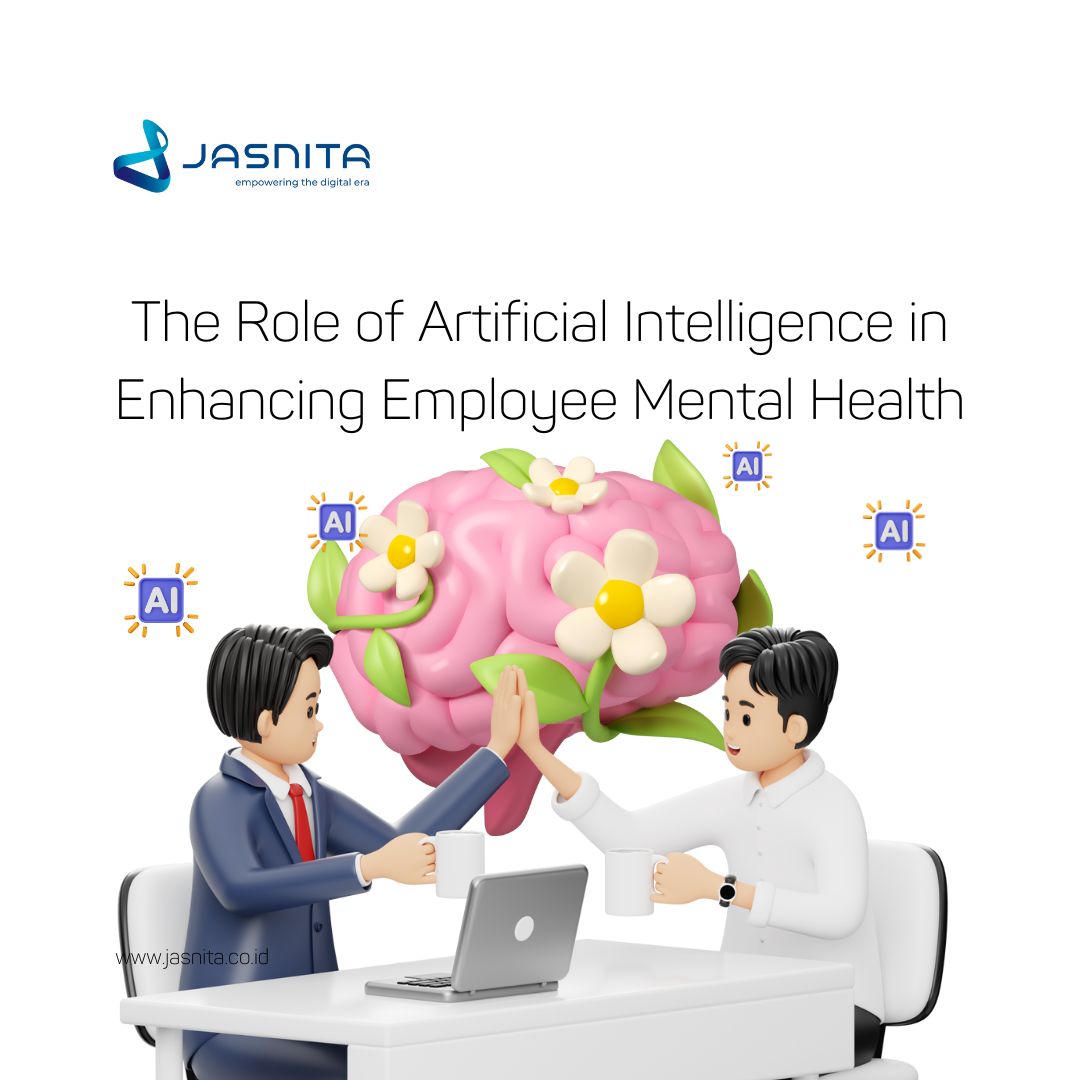Blog
Tetap terkini dengan wawasan bisnis kami, tips ahli, dan berita industri. Tingkatkan pengetahuan Anda dengan tren dan strategi terbaru untuk kesuksesan bisnis.
Peran Kecerdasan Buatan dalam Meningkatkan Kesehatan Mental Karyawan
Waktu Publikasi Senin, 23 Desember 2024 | Terakhir Diperbarui 6 bulan yang lalu

Dalam dunia kerja yang semakin dinamis dan penuh tekanan, kesehatan mental karyawan menjadi isu yang semakin penting. Perusahaan harus mencari cara untuk mendukung kesejahteraan mental karyawan mereka, dan salah satu solusi yang muncul adalah penggunaan kecerdasan buatan (AI). Artikel ini akan membahas bagaimana AI dapat membantu meningkatkan kesehatan mental karyawan, serta tantangan yang mungkin dihadapi.
1. Pengurangan Beban Kerja dan Stres
Salah satu manfaat utama dari AI adalah kemampuannya untuk mengotomatiskan tugas-tugas rutin dan repetitif. Dengan mengurangi beban kerja, AI membantu mengurangi stres yang dialami karyawan. Misalnya, penggunaan chatbot untuk menjawab pertanyaan umum dapat mengurangi jumlah tugas administratif yang harus ditangani oleh karyawan, sehingga mereka dapat fokus pada pekerjaan yang lebih strategis dan memuaskan.
2. Peningkatan Efisiensi dan Produktivitas
AI juga dapat meningkatkan efisiensi kerja dengan memberikan analisis data yang cepat dan akurat. Dengan informasi yang tepat, karyawan dapat membuat keputusan lebih baik dan lebih cepat, yang pada gilirannya meningkatkan produktivitas mereka. Ketika karyawan merasa lebih produktif, hal ini berkontribusi pada peningkatan kepuasan kerja dan kesehatan mental.
3. Dukungan Kesehatan Mental yang Dipersonalisasi
AI dapat menganalisis data untuk memberikan dukungan kesehatan mental yang dipersonalisasi kepada karyawan. Misalnya, platform berbasis AI dapat merekomendasikan program kesejahteraan yang sesuai dengan kebutuhan individu atau menghubungkan mereka dengan sumber daya kesehatan mental yang relevan. Ini membantu menciptakan lingkungan kerja yang lebih mendukung dan memperhatikan kesejahteraan karyawan.
4. Mengurangi Isolasi Sosial
Meskipun ada kekhawatiran bahwa penggunaan AI dapat menyebabkan isolasi sosial di tempat kerja, jika diterapkan dengan benar, AI dapat membantu membangun koneksi antara karyawan. Misalnya, platform kolaborasi berbasis AI dapat memfasilitasi komunikasi dan interaksi antar tim, sehingga mengurangi perasaan kesepian di antara karyawan.
5. Tantangan yang Dihadapi
Meskipun ada banyak manfaat, penggunaan AI juga membawa tantangan tersendiri. Salah satu masalah utama adalah potensi ketidakamanan pekerjaan akibat otomatisasi, yang dapat menyebabkan stres dan kecemasan di kalangan karyawan. Selain itu, keputusan yang diambil oleh sistem AI mungkin dipengaruhi oleh bias data, yang bisa berakibat pada perlakuan tidak adil terhadap karyawan.
Kecerdasan buatan memiliki potensi besar untuk meningkatkan kesehatan mental karyawan dengan mengurangi beban kerja, meningkatkan efisiensi, memberikan dukungan personalisasi, dan mengurangi isolasi sosial. Namun, perusahaan perlu menyadari tantangan terkait penggunaan AI dan mengambil langkah proaktif untuk memastikan bahwa teknologi ini diterapkan dengan cara yang mendukung kesejahteraan karyawan.
Sebagai penyedia solusi teknologi terdepan, Jasnita berkomitmen untuk membantu perusahaan dalam menerapkan sistem AI yang tidak hanya meningkatkan efisiensi operasional tetapi juga memperhatikan kesehatan mental karyawan. Dengan mengintegrasikan teknologi canggih dalam lingkungan kerja, Jasnita berupaya menciptakan tempat kerja yang lebih sehat dan produktif bagi semua.